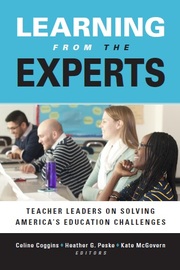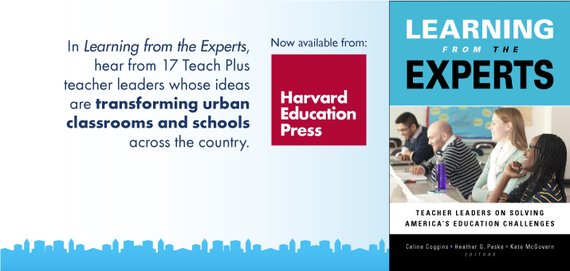Published by Harvard Education Press, Learning from the Experts: Teacher Leaders on Solving America's Education Challenges is a celebration of teachers as change makers. In it, readers will hear from 17 teacher leaders whose ideas and tenacity are transforming urban classrooms and schools nationwide.
This week, read an excerpt from Chapter Five: Engaging Early Career Teachers in the Union by Karen McCarthy and this new essay by NEA/Teach Plus Future of the Profession Fellow Rob Powers.
Unions and the New Majority of Teachers:
How Can We Work Together?
Rob Powers
One of my favorite movies is the 90s classic "Office Space." In one scene, a mid-level employee is meeting with a consulting team that will make recommendations for downsizing. In the exchange, the consultants start with a simple question:
"What would you say you do here?"
The flustered employee struggles to answer the question and hilarity ensues. I laugh at this scene because I, like many of my fellow educators, can relate: When it comes to defining what our unions do for us, many educators, especially those early in their careers, would ask the very same question.
For many early career educators, their relationship with local, state, and national unions is passive at best. They're signed up at the new teacher orientation and told that the union is there for them when they get in trouble. Then the sizeable dues start coming out of their paycheck. For many teachers, this is the extent to which they engage with their union. No wonder membership is down and the younger generation of teachers is least likely to engage in union activities.
Is this really all a union does? It turns out, not necessarily. While unions do in fact spend a lot of time and resources on bread and butter issues, there is a new paradigm shift happening in the American education labor movement. Our unions are beginning to champion the notion that if education reform is inevitable, it is best left to the experts: classroom teachers.
In a recent address, NEA President Dennis van Roekel said it best when he charged that we must take back education reform from the outsiders. If this vision were to fully develop, we would see a new unionism based on professional practice issues instead of primarily money and contract language. In short, this would result in a public school system where teachers are considered the experts and lead change through our unions.
This is where there are tangible opportunities to engage early career teachers in the union. As we all remember, the first few years of teaching are rewarding and transformational, but also brutal. New educators are so bogged down in surviving and developing as effective teachers that they hardly have time to attend union meetings, join a negotiation committee, etc. But the new vision of professional leadership speaks to the heart of what it means to be a new teacher. By showing younger teachers that the union is the vehicle through which we can not only voice our concerns and issues with top-down initiatives, but also where we can develop and implement our own solutions regarding teaching and learning, we could engage a new generation of union members.
This is no simple task, as early career teachers have historically been difficult to engage. But new initiatives such as the NEA/Teach Plus Future of the Profession Fellowship, of which I am a participant, seek to bridge that divide.
Some may ask why engaging early career teachers in the union could be considered the most important work of our generation. The answer is in the demographics. Nationwide, the majority of teachers have ten or fewer years of experience. If unions are to remain viable, they must engage this "new majority" of teachers.
This doesn't mean leaving veteran teachers in the dust. Their experience and skill sets are invaluable resources to their fellow teachers. This movement shouldn't be seen as a "coup" by reform-minded young teachers, but rather the forging of a new partnership within the profession across all levels of experience and ability. For example, unions could take a more active roll in mentoring new teachers. I was introduced to professional unionism though my mentor, who happened to be our local treasurer. I considered her capacity as a union leader to be just as helpful when I was starting out as the formal mentoring curriculum. It is our colleagues, other teachers, who will make new educators most effective in the classroom.
In an era where education reform has become a political hot potato and there exists an "us versus them" standoff between teachers unions and outside groups, we must look to rise beyond rhetoric. As unionized teachers we must look within and to our colleagues to find effective and meaningful reforms and take action through our unions to make sure our students receive the best education we can provide .
Rob Powers teaches social studies at Apponequet Regional High School in Lakeville, Massachusetts. He currently teaches World History II, US History I, American Government & Civics, and AP European History. He serves as a trained mentor for emerging teachers, and has been elected for two terms as a building representative for the Educators Association of Freetown & Lakeville. Rob is a current NEA/Teach Plus Future of the Profession Fellow.
Want more from Learning from the Experts? Read an excerpt from the introduction by Teach Plus CEO Celine Coggins, or these responses to Chapter Five: Engaging Early Career Teachers in the Union by NEA/Teach Plus Future of the Profession Fellows Jane Rezos and Stephanie Molloy.

